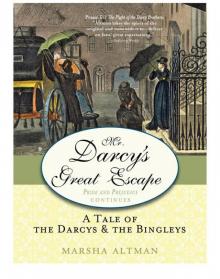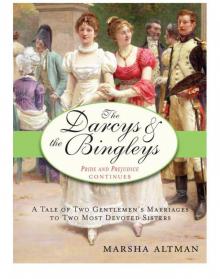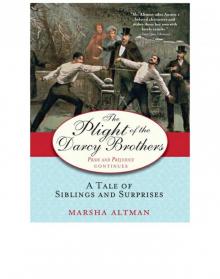- Home
- Marsha Altman
The Plight of the Darcy Brothers Page 24
The Plight of the Darcy Brothers Read online
Page 24
“I know. Why didn't we think of that?”
“Charles!”
He took her hand. “Are you thinking what I am thinking?”
“I am looking forward more to the idea of more children, should they come to be. But that is all for God to decide, as our new brother-in-law would say.”
“Well, if a christening makes you so maternal, you may very well have another to enjoy very soon.”
“I never said I stopped loving our children! I just would prefer that we have them at a convenient time and in a convenient order!” She nestled into his shoulder. “Oh, if only life were so simple.”
“It would certainly be less interesting.”
THE LAST BENNET
MADDOX DID MAKE IT to Derbyshire in time, because Mary was a week late, and with him came Caroline and their two children. “As long as your brother doesn't loot us out of house and home while we're gone, we should be fine,” Caroline said as they stepped out of the carriage.
“I think Brian will do just fine.”
“That's what I'm worried about.”
Caroline would not leave her infants, and Bingley welcomed them both, saying that with his children nearing their second birthday, Chatton was becoming eerily quiet. Of course, there was some shock among the less-informed of his guests about the Maddox children, who were not actually twins and did not look a bit alike, as tiny Frederick had brown hair, unlike his sister or his parents as babies. Dr. Maddox just shrugged at any questioning about the peculiar timing of the adoption. Though happy to be back in her grand gowns, Caroline surprised the Chatton crowd with her overwhelming affection for her infants, having taken to motherhood with unexpected vigor.
“It's positively endearing,” Jane said to Lizzy when she came in. “And a little bizarre.”
While being late to deliver was not an abnormal occurrence, each day that Mary was late created increasing tension, and she was even harder to corner than normally.
When Elizabeth finally did, it was in Mary's room, which was all set up with a cradle for the baby. Mary was staring out the window, fingering a beautiful locket that Elizabeth did not remember seeing before. “Mary? Are you all right?”
“I am fine.”
“I meant it more generally.” Elizabeth gasped. “Oh! I completely forgot!” she added. “Miss Talbot sends her regards. She says she very much wishes to visit when she returns from the Continent.”
Mary turned around. “She does?”
“Yes, very much so. In fact, she was instrumental in locating Mr. Mastai, so we owe her a great debt. Though, I will say, she was not a gossip. I did have to pry the information out of her.” She joined Mary by the window. As her condition increased, Mary had been keeping her distance from everyone, shriveling away from contact. “She said there was genuine affection between you and Mr. Mastai. He did say most truthfully that he loved you, whatever the circumstances that resulted.”
“I know,” Mary said. “He wrote that in his letter that Mr. Maddox delivered. Giovanni was never once insincere, so I don't doubt it now.”
“Did he give you the locket?”
“Yes. So the child will know its father, even if some things cannot be.” Even though there was heaviness to her voice, it was not filled with sadness. “I love him, but it is not as though I cannot imagine life without him. I would be so desperately lonely for all of you in Italy, even if he quit the church. And he would be adrift here, as Grégoire is, even though he is half-English.”
“Grégoire will not stay,” Elizabeth said. “Darcy will find a monastery to his liking somewhere and he will leave us, but he will visit. But you're right, in that he is a blood relative with no other standing family, so his situation is entirely different.” She sighed. “Some people apparently do wish for the contemplative life.”
“Giovanni does not. He will hardly be a monk, and he has obligations,” she said.
“Mary, there are others out there. In fact, you will find many a man in England who has not promised his life to the Catholic Church.”
“But this is not about me,” Mary said. “Not entirely. I should not be so selfish.” She stroked her stomach. “Nine months is so long. I was so miserable with worry, and now I realize I have something to look forward to.” She smiled. “Excuse me, Lizzy, but I must sit.”
“Oh, yes,” Elizabeth helped her into the armchair. She was surprised Mary had been standing that long. “Please.”
“Did you fancy Rome?”
“It had its spectacles, but it was terribly hot and had a rather bad stench in the late afternoon,” Elizabeth said. “I would not want to spend more time there than I did. The food, though, was amazing. It is better to live outside the city in a villa. Mary?” For she noticed her sister had gone pale. “Mary!”
“It—is probably nothing. But please, I would appreciate Mama being in a different room from me when you tell her.”
Mary suffered through nearly two cruel days of labor, to the point that her health became a serious concern, and Dr. Maddox was called in to take a look. “I think the child is merely taking its time. Everything appears fine, Miss Bennet.”
“You useless—” and then Mary let loose a stream of Italian unknown in nature to the crowd of women that surrounded her, for Mrs. Maddox had opted out of being at her side. From Dr. Maddox's reaction, what she had said was not particularly polite. He left red-faced and did not return.
He was correct in his estimation, for without any complications except the exhausting length of the labor, Mary delivered a healthy baby boy, whom she immediately named Joseph, the allusion being obvious. Dr. Maddox insisted that she drink more than she was inclined and be washed, but he made no other important medical notations.
Without anyone to admit him, Mr. Bennet knocked on the door, asked to see his grandson, and took the seat beside his daughter. Little Joseph Bennet wailed in his grandfather's arms as Mr. Bennet wiped the baby's chin. Elizabeth emptied the room of everyone but the mother and the grandfather, and she was about to excuse herself, but she thought the look on her father's face was too memorable. He loved all of his grandchildren, but this look was positively radiant. Mary was partially asleep and could only have been minimally aware of anything, much less her father's gentle laughter and tears of joy as he held the boy he would raise under his own roof, the boy who would take his name, his legacy. Of all the girls, only Mary had given that to him.
Elizabeth did excuse herself, but neither person noticed. She ran right to her room and found Darcy inside, being dressed for the celebratory dinner. She gave his manservant a look, and as he bowed himself away, Elizabeth ran to her husband, who towered over her more than usual on his dressing stand, and hugged him.
“Lizzy?”
“Nothing. I'm just—so happy. For Mary,” she said. “And Papa.”
“I must admit myself that my opinion of relations beyond marriage has been raised considerably over the last few months.”
After Mary was out of danger, Mr. Bennet and Mr. Darcy made a trip to Town to settle all of the accounts, and Mr. Bennet went from there to open up Longbourn from his longest absence since the birth of Jane. Some of his servants had found other work, he discovered, and together with his son-in-law, he saw about hiring new ones and fixing the roof. Mr. Bennet was in such a good mood that he even traveled back to London with Darcy so he could escort his returning family home.
“You could do some renovations,” Darcy suggested.
“Only if Mary requests. It is, after all, her money. Though, I doubt she or I are equipped to deal with it.”
“It should be properly invested,” Darcy said. “I would be happy to offer the services of my steward, who is most trustworthy. In addition, the trust fund for Master Joseph—Mr. Joseph Bennet—will mature considerably in the seventeen years before he gains access to it. It may be as much as fifty thousand by then.”
“Fifty thousand pounds,” Mr. Bennet said in disbelief.
“They will be waiting in line, once they
hear of Mary's inheritance, however obtained and whatever baggage it brings.”
Mr. Bennet could not seem to fathom it all. He shook his head. “Mary does not seem the marrying type, or at least, is not willing to put herself on the market just yet, certainly. Maybe in a few years. My pressing concern is Kitty, who herself is now a prize, to be honest, with ten thousand pounds. Perhaps I should buy her an apartment in Town. She and Georgiana do get along well.”
“They do. And Mrs. Maddox's temperament has improved tremendously since her marriage.”
To this, Mr. Bennet only smirked in reply.
When they returned to Chatton, preparations were underway to somehow get all of the infants back to their homes, for everyone had had enough of newborn squealing, except perhaps Lydia, who had finally arrived to greet her new nephew. Joseph was christened in the same chapel as his cousins, as the vicar gave Grégoire a disapproving look for just existing in that bizarre medieval way of his.
After a luncheon, Darcy and his brother excused themselves while Elizabeth was still absorbed in her new godson and nephew. They had something to do at Pemberley that concerned no one else.
“Is there something we should say? At this point?”
Darcy and Grégoire stood on that bright fall afternoon in front of the gravestone of Geoffrey Darcy, who had died on that very day, ten years before. In the graveyard behind Pemberley, no one would disturb them.
“I'm not a priest and, therefore, cannot say a Mass,” said Grégoire. “Nor do I have the implements to do so.”
“He was… a wonderful man.”
“A loving father.”
“An excellent gentleman. In… most respects. He did everything in his power to steer me correctly. And you are a hopeless cause anyway.”
Grégoire smiled.
“He did do what was in his power to… bring us together.” Darcy knelt beside the grave. “He taught me everything he knew. Except how to deal with Mr. Wickham.”
“No one told me I was invited.”
They turned to the approaching figure, the person in question. Just getting off his horse, still in partial regimentals, was George Wickham.
George Wickham did not consider himself a selfish man. By definition, that would imply he thought only of himself, and he did not. He had many other people on his mind. Granted, he wasn't always handing out money to others, but he liked to interpret the word to mean he never thought of other people— which he did, quite a lot. For one, his wife was a talker, though he blamed Darcy for that one. Not for making her the country horse that she was, but for forever tying her to him in some kind of sadistic plan of revenge for some perceived slight. He had also been responsible for turning Darcy into the man he was, quite literally, in one night with a fancy lady in Cambridge. And I paid for that out of my own pocket! Never asked for it back! Ungrateful little brat!
All right, so he envied Darcy of Pemberley and Derbyshire. The most prim and proper of men, except when he was drunk or locked in a room with a whore while drunk, but honestly, most of the stories Wickham couldn't tell most of the stories he knew out of fear of self-incrimination. Darcy had had one dirty evening after Wickham left Cambridge and that he had heard of in passing, but he never knew the full story. The only one who knew it was Charles Bingley, the First Mate on the Darcy Ship and stupidly, stupidly loyal. Emphasis on stupid. He would never get a word from him.
Since becoming Mr. Darcy of Pemberley, Darcy had been the most upstanding and proper man, to the point that Wickham wondered the precise height and width of the stick up his arse. Darcy waited until he was nine and twenty to marry Elizabeth Bennet, that courtship behind guarded with such traditional Darcy secrecy that not even that squealing, gossipy wife of his could account for it. Wickham had tried to learn the truth of it himself on the wedding day, only to be rewarded by having his last remaining fine suit stained with cow droppings when Darcy reacted to his presence by pushing him out a window and into the manure pile below. Darcy would have nothing to do with him, and that was that.
But not everything on Wickham's end could be severed. While technically they were brothers-in-law, Wickham was never permitted entrance anywhere near Pemberley, even when his wife was, and she so rarely was that it was barely worth trying. And he did miss Pemberley, he begrudgingly admitted to himself when he was drunk enough to do so. It was not just the money practically dripping from its ancient walls, either. The happiest years of his life had taken place there, even after the death of his father, when Mr. Darcy had taken him in and treated him like a king. His son did not show the same kindness. Yes, he'd given him the worth of the living, but surely Darcy had enough intelligence to know he'd lose it all and come crawling back? Why couldn't he just shut up and beg his way back into Pemberley? The plan with Georgiana had been a last resort. The plan with Mary King had been the last resort of a… last resort.
Maybe he should have taken the church living. Celibacy was not expected of a vicar. But then he would have to deliver boring sermons. Caught between a rock and a hard place. As if Darcy ever found himself in that position.
Wickham was nibbling on that piece of gristle—and an actual piece of gristle—when a letter arrived from Lydia. She did love to gab, but sometimes that was to his benefit, especially when it involved the Darcys. And this time, it was. When Lydia had gone to Chatton to see to the birth of her unmarried sister's bastard child (scandal enough, but not worth a penny in Newcastle), she had also been introduced to a monk who was Darcy's bastard brother. It seemed the senior Mr. Darcy, whom they both had regarded so highly, had had his own little extramarital dalliances.
Perhaps that was why, Wickham pondered as he sped to Pemberley, Mr. Darcy had been good enough to turn a blind eye to all of the maids he fired for mysteriously becoming “with child” as soon as Wickham learned of the bounty of feminine delights. The old fool was no fool, but he was apparently not practicing what he preached. Mr. Darcy would have made a terrible vicar, as well.
With that consolation, Wickham expertly bypassed the guards and the field workers. He would not be admitted to Pemberley itself. His only hope was to catch Darcy visiting his father's grave on the anniversary of the senior Darcy's death. If not, at least Wickham would visit the graves of his own parents, as the private graveyard had a section for the beloved Wickhams. He hadn't been bothered in years—in fact, he couldn't think of a time he'd seen the stones since the one for his father had gone up, and he'd never known his mother—but it seemed as good a time as any.
To his great luck, Darcy was there. He was not alone, but guards did not flank him, either. Beside him was a young man in grey monk robes and sandals, his long string of beads hanging off his rope belt, and his brown Darcy hair in a ridiculous tonsure. The hair style probably had been implemented to make the balding abbots feel better about their hair loss. But the familial resemblance was undeniable, especially when Darcy put his arm over the monk's shoulders as they mourned their father, a rare gesture of affection that made it all the more affectionate.
A pang of jealousy struck Wickham. When they were boys, he and Darcy had been friends, even like brothers. When they were very young boys, before all the jealousy and rivalry set in. This stupid Papist had missed all of the taunts, the spars, and the rides, and instead had the same affection bestowed on him that Darcy probably showed Georgiana. He looked that age, too.
They had not noticed him, but when he was mentioned in their conversation, Wickham felt obligated to announce his presence. “No one told me I was invited,” he said.
Shock and alarm described Darcy's reaction as Wickham dismounted and approached him.
“Darcy.” Wickham bowed and turned to the monk. “And I do not believe we have been introduced.”
He did believe, unless Darcy chose to lie outright, that the scandal would be revealed now, in front of the grave of the man who had wrecked the family. Or had potential to. Surely Darcy would put up a sum of money just to keep Wickham's mouth shut about a stain on the house of Pemberl
ey.
By his estimation, a great sum of money. And he intended to get every shilling of it.
THE DARCY BROTHERHOOD
DARCY LOOKED AT HIM with levels of barely controlled rage. Wickham was more than familiar with this. While Darcy was a mystery of a man to everyone else, Wickham knew him better. And one of the surest things he knew was that the man knew how to keep grudges. When Darcy intruded on his absconding with Lydia, Wickham was fairly sure (at the time) that it was more about getting his revenge for Georgiana and doing that white knight thing he loved so much to do.
Only later Wickham found that Darcy's actions had been more about maintaining Lydia's sister's social standing so Darcy could marry her, which was not a huge surprise, either. Darcy cared about social standing. He would pay a lot of money to protect a family's honor, an astronomical amount to protect his own. And here Darcy was, cornered with proof of his own father's indiscretions in the form of a church mouse, and all he could manage was a deeply intoned, “Wickham.”
“I suppose I'm not going to be introduced. Well, I don't know your name, but Lieutenant George Wickham at your service.” He bowed politely, taking off his regimental hat.
“Brother Grégoire,” said the monk, bowing in innocence. “Grégoire Bellamont, sir.”
“Bellamont? Wasn't that… wasn't that the name of one of Mrs. Darcy's maids? From when we were young. Fitz?”
“Yes,” Darcy growled. “Your attempts at civility are tiring. Yes, he is our half-brother.” Of course, he was referring to himself and Georgiana, who was not present.
“At least I was trying. Live and let live? Forgive and forget? Isn't that one of your people's teachings, Brother Grégoire?”
“Yes,” said the monk, or more accurately, the pawn, overshadowed by the two much larger players with more moves. His accent was partially French. Darcy must have picked him up on the Continent like a souvenir, then brought him home because of some ridiculous honored notion that a son should see his father's grave or some such nonsense. “We are all poor sinners.”

 The Knights of Derbyshire
The Knights of Derbyshire Other Tales: Stories from The Ballad of Gregoire Darcy
Other Tales: Stories from The Ballad of Gregoire Darcy The Ballad of Gregoire Darcy
The Ballad of Gregoire Darcy Mr. Darcy's Great Escape
Mr. Darcy's Great Escape The Darcys and the Bingleys
The Darcys and the Bingleys The Plight of the Darcy Brothers
The Plight of the Darcy Brothers The Road to Pemberley
The Road to Pemberley